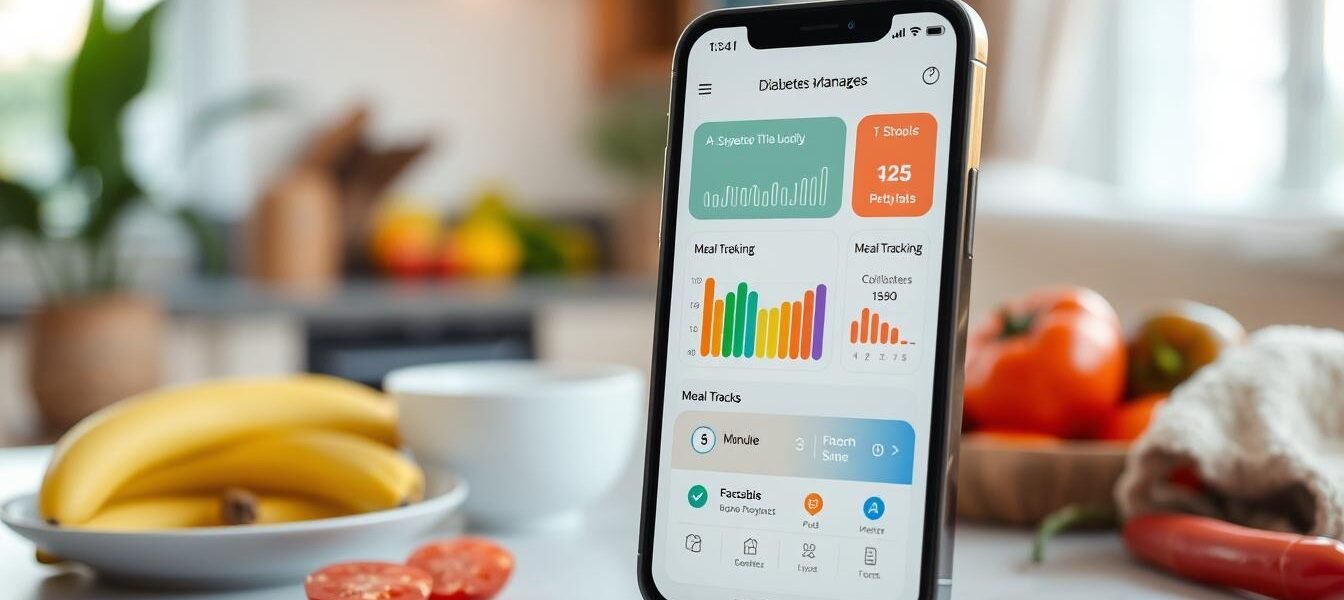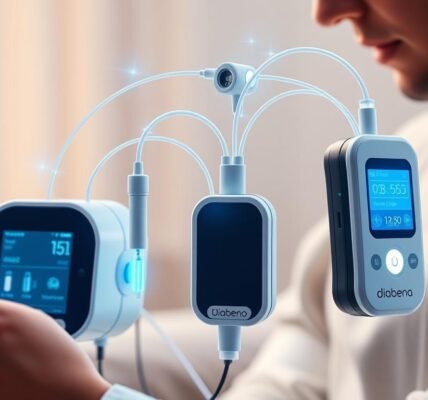“The greatest wealth is health.” – Virgil. This saying is very true when you’re managing diabetes. You might look for tools to make your health journey easier. It’s important to pick a diabetes management app that fits your lifestyle well.
The best apps let you personalize your health care. They help you manage blood sugar, control weight, and stay healthy overall. Features like reminders for medication, tracking your food, and health reports help you take control of your health.
Thanks to technology and help from healthcare experts, finding the right app is easier. It makes your daily routine simpler and improves your health a lot123
Key Takeaways
- Choosing the right diabetes management app is vital for personalized health care.
- Features like medication reminders and food tracking enhance your ability to manage diabetes effectively.
- Staying updated with technology plays a crucial role in ongoing diabetes management.
- A well-chosen app helps you maintain control over your health and empower your daily decisions.
- Integrating an app into your daily life can significantly simplify managing diabetes.
Understanding the Importance of Diabetes Management Apps
Managing diabetes well means keeping track of glucose levels and sticking to a routine. Apps for diabetes help users do this by tracking glucose, meds, and food. With diabetes affecting 1 in 11 people globally, these apps are more crucial than ever4.
Studies show that young people and tech-savvy doctors like using diabetes apps4. A study with 92 participants found that users like easy-to-use apps and automatic data uploads5. This shows how important good app design is for a better user experience.
Apps make managing diabetes easier and can lower blood sugar levels in type 2 diabetes patients45. They offer reminders, alerts, and interactive features. These help users stay in touch with doctors and monitor their health from afar, leading to better health outcomes.
Key Features to Look for in a Diabetes Management App
When picking a diabetes app, look for key features that help with self-care. A good app should have strong food tracking and a big database of foods. This helps you keep track of carbs. Also, a medication reminder tool is key for logging doses and reminders, so you never miss a dose.
Food Tracking and Nutritional Databases
Food tracking is a must in any diabetes app. Choose apps with lots of food data to help you make smart food choices. Some apps even use photos to help guess carbs, making it easier to manage your diet for everyone.
Medication Management Capabilities
Good medication management lets you log doses and get reminders. This is crucial for keeping healthy. Studies show apps with strong medication tools can improve health, like lowering HbA1c levels6. Getting reminders helps stick to your medication plan and control diabetes better.
Blood Glucose Management Tools
Blood glucose tools are key for managing diabetes. Look for apps that let you log glucose levels and connect with devices or CGM systems. This helps you see your sugar patterns and trends7. The market for these tools is growing, showing more people want to manage their diabetes well.
![]()
| Feature | Description | Benefits |
|---|---|---|
| Food Tracking | Database that includes nutritional information for various foods | Helps monitor carbohydrate intake |
| Medication Reminder Tool | Tool for logging medications and setting reminders | Enhances adherence and ensures timely doses |
| Blood Glucose Management | Integration with CGM and blood glucose meters | Provides data for better glucose level tracking and adjustments |
By focusing on these core features, you can find a diabetes app that meets your needs and improves your health.
Types of Diabetes Management Apps Available
There are many diabetes management apps out there. Each one meets different needs, helping you find the perfect match for your lifestyle. Knowing what’s out there can help you pick the right tools for your health.
Glucose Monitoring Apps
Glucose monitoring apps are key for tracking your blood sugar levels. They help you see patterns in your readings, guiding you to adjust your care plan. Features like manual entry, syncing with devices, and alerts for highs or lows are common.
Apps like Glucose Buddy let you log meals and activities. This gives you a full view of your diabetes management8.
Blood Sugar Tracker Apps
Blood sugar tracker apps help you log and see your glucose levels. They offer customizable reports to track your progress. You can analyze how food, exercise, and more affect your sugar levels.
These apps are easy to use and often free. This makes it simple to add them to your daily routine9
Each app you explore should align with your individual health goals and needs, ensuring an effective diabetes management experience.
Benefits of Using a Diabetes Management App
Using a diabetes management app can greatly improve your health journey. These apps, like a diabetes journal and health tracker, are key. They help you see how your daily actions affect your blood sugar.
Improving Self-Care and Awareness
Apps for managing diabetes encourage you to take a more active role in your health. Young women, in particular, are more likely to use these apps. This shows a trend towards more empowered care among some groups.
Studies reveal that how users see the benefits and how easy the app is to use matter a lot. Healthcare professionals’ recommendations also play a big role in whether people use these apps10.
Facilitating Communication with Healthcare Providers
Apps also make it easier to talk to your healthcare provider. By sharing your health data, doctors can make better treatment plans. This improves your care.
However, doctors are less likely to suggest these apps if they don’t see the benefits. This highlights the importance of well-designed apps10. Research shows that using technology in this way boosts user engagement. It also meets the growing need for diabetes care, with diabetes cases expected to rise by 46% by 204511.
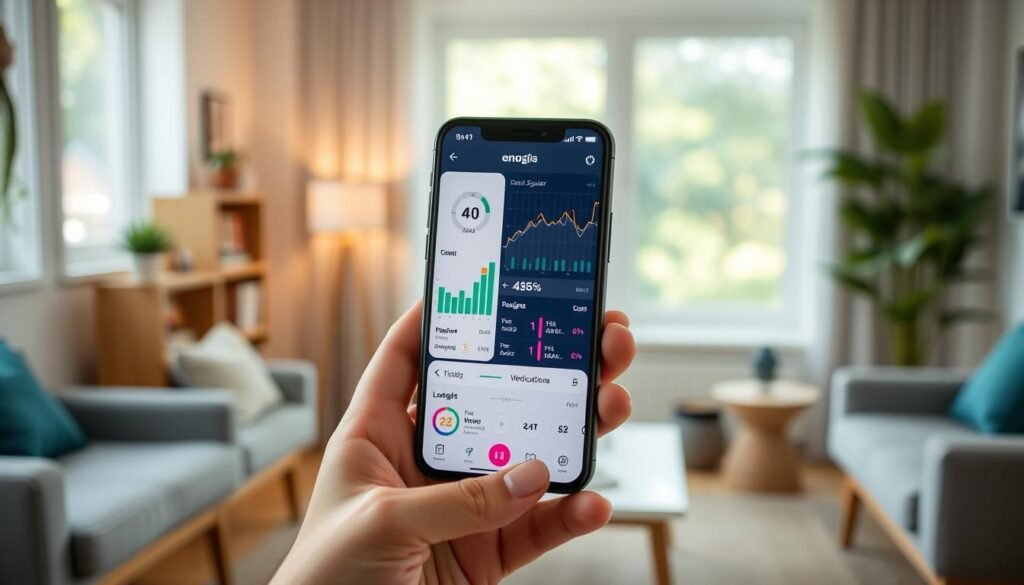
How to Personalize Your Diabetes Management App Experience
To get the most out of your diabetes app, making it personal is crucial. Customizable health reports are a big plus. They let you track health metrics that matter most to you. Plus, an insulin tracker gives you instant updates on your insulin use, helping you manage your diabetes better.
Customizable Health Reports
Custom health reports help you see important data and make smart health choices. They should match your personal health goals and lifestyle. As the digital diabetes management market grows, so does the need for these tailored features12. Being able to pick what data you see makes the info more useful, helping you manage your diabetes effectively.
Integration with Other Health Devices
Connecting your app with other health devices makes it more useful. It lets you link data from fitness trackers and glucose monitors, giving you a full picture of your health. Real-time monitoring is key for making smart health choices13. Adding these connections is essential for personalized care and shows the trend towards better healthcare through remote monitoring14.
Evaluating User-Friendly Features
The success of a diabetes app depends on how easy it is to use. Look for apps that make it simple to enter data. They should have clear interfaces for logging glucose levels, carbs, and meds.
This makes tracking your health quick and easy. You can then focus more on managing your health.
Ease of Inputting Data
Good diabetes apps make entering data easy. Do you like using voice commands or tapping on the screen? Choose an app that fits your style.
Apps that are easy to navigate keep you engaged. This leads to better tracking of your health.
Graphical Representation of Data
Seeing your health data is key. Apps with clear charts and trends help you understand your health fast. They make it easier to see your glucose logs and diet.
This helps you make better choices. It’s crucial for managing your diabetes.
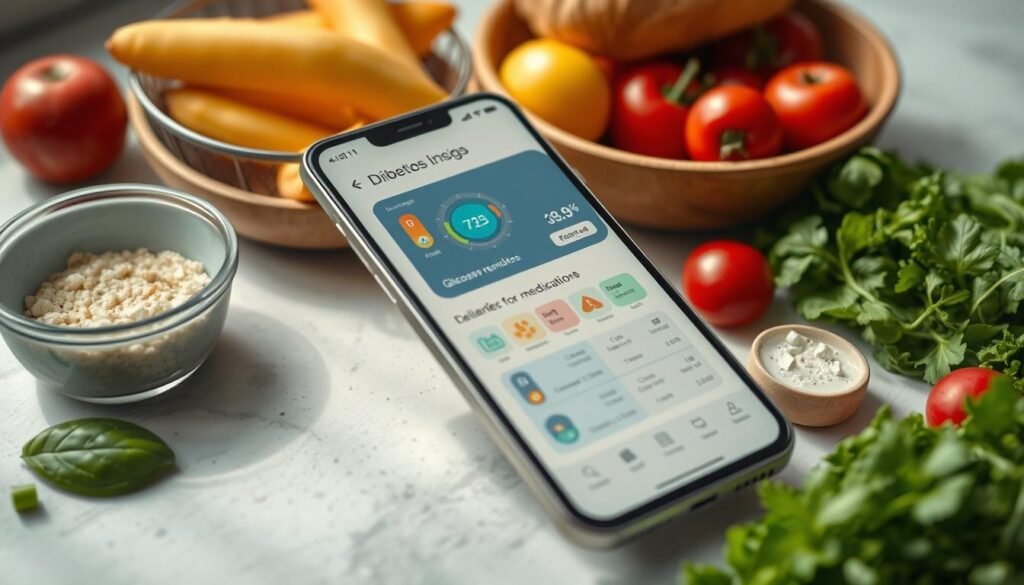
Reading Diabetes Management App Reviews
When picking a diabetes app, reading user reviews is key. They offer real-life views that help you decide. Look at app ratings on different platforms to find the best fit for you.
Importance of Real User Feedback
User feedback is essential for judging diabetes apps. Apps like Lose It! and MyFitnessPal have high ratings, showing they meet user needs15. Carb Manager also gets high praise, making it a top choice15. These ratings help narrow down your options.
Comparing App Ratings Across Platforms
App ratings can vary across platforms. Figwee Visual Food Diary has a high rating on Apple but a lower one on Android15. MyFitnessPal offers premium features for a fee, which users find worth it15. Each app has its own strengths, like BD Briight’s voice recognition and MySugr’s gamification16. Reading reviews carefully can guide you to the best app.
| App Name | Apple Rating | Android Rating | Premium Cost |
|---|---|---|---|
| Lose It! | 4.8 | 4.1 | $39.99/year or $149.99/lifetime |
| MyFitnessPal | 4.7 | 4.3 | $79.99/year or $19.99/month |
| Carb Manager | 4.8 | 4.7 | $39.99/year or $8.49/month |
| Figwee Visual Food Diary | 4.7 | 3.4 | $7.99/month |
| Calorie Counter by FatSecret | 4.7 | 4.6 | $6.99/month |
Popular Diabetes Management Apps in 2022
Many apps have become popular for managing diabetes in 2022. They offer features like food tracking and blood glucose monitoring. Here are some top picks to help you manage your diabetes better.
MySugr: Comprehensive Diabetes Management
MySugr is a top tool for diabetes management. It helps with carb counting and glucose tracking. Its fun interface motivates users to stay healthy and follow their plans.
It’s great for both type 1 and type 2 diabetes. MySugr works with Apple Health for full support17.
Fooducate: Healthful Eating Made Easy
Fooducate helps you make better food choices. It has a huge database for nutritional checks. It tracks meals and gives health tips based on your diet.
It also logs meals and exercises. Fooducate lets you control your diet17.
Glucose Buddy: Integrated Technology
Glucose Buddy tracks blood sugar and meals easily. It works with Dexcom G5 and G6 for precise monitoring. It’s perfect for learning about diabetes with its 12-week plan.
Glucose Buddy offers different plans for all budgets. It gives you the tools you need for good management17.
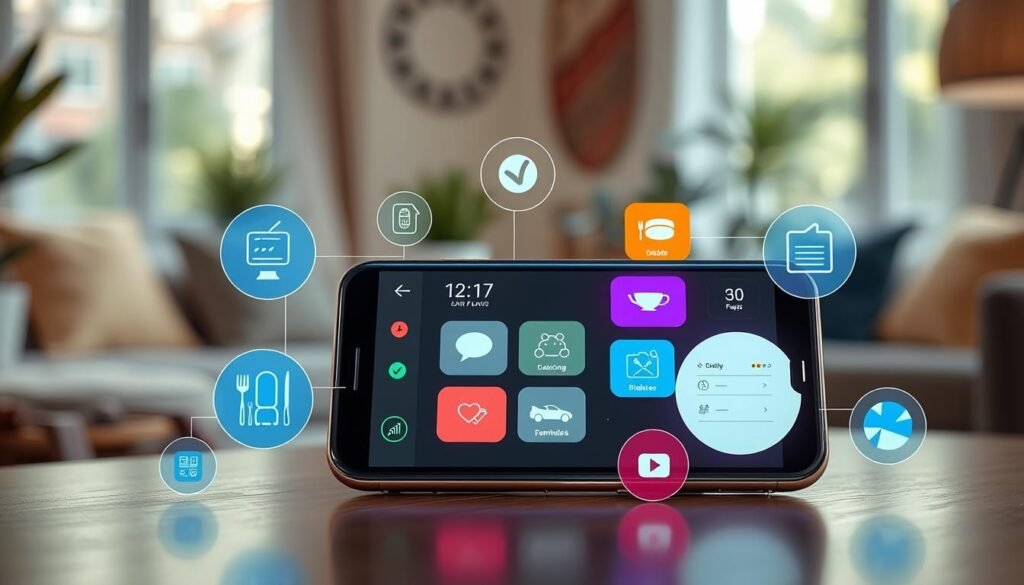
Free vs. Paid Diabetes Management Apps
Choosing between a free and a paid diabetes app can greatly affect your care. Free apps give you basic tools to track your health. But, paid apps offer more advanced features that can improve your care experience.
What Features Are Worth Paying For?
Premium apps have cool features like detailed analytics and personalized meal plans. MySugr Pro, for example, costs $2.99 a month or $27.99 a year. It lets you create PDF reports and set reminders, making it easier to use18. Fooducate also has premium options starting at $1.99, offering health education tailored to your needs19.
The Value of a Subscription Plan
Getting a subscription app can be a smart move. If your employer or health insurance covers it, you get premium features without extra cost. Clinical trials might also offer premium features for free, letting you try different apps18.
Remember, only a few apps in studies showed real improvements. So, pick one that fits your diabetes care needs well20.
Understanding Your Specific Diabetes Needs
Managing diabetes means knowing what your type needs. Each type of diabetes has its own challenges and ways to manage it. It’s important to find an app that fits your condition, whether it’s Type 1, Type 2, or gestational diabetes. The right tools, like a good gestational diabetes app, help track health for both mom and baby.
Type 1 vs. Type 2 Considerations
Type 1 and Type 2 diabetes need different approaches. Type 1 diabetes means watching insulin levels closely. Type 2 focuses on blood sugar, diet, and exercise. Diabetes apps offer various features, like CGMs for Type 1, and diet tracking for Type 22122.
Gestational Diabetes Management
Gestational diabetes needs special care during pregnancy. It’s not just about blood sugar; it’s about overall health. A good app tracks important health signs, keeping mom and baby safe. These apps send alerts for high or low blood sugar, crucial during pregnancy. A detailed gestational diabetes app helps manage both health needs, offering personalized advice.
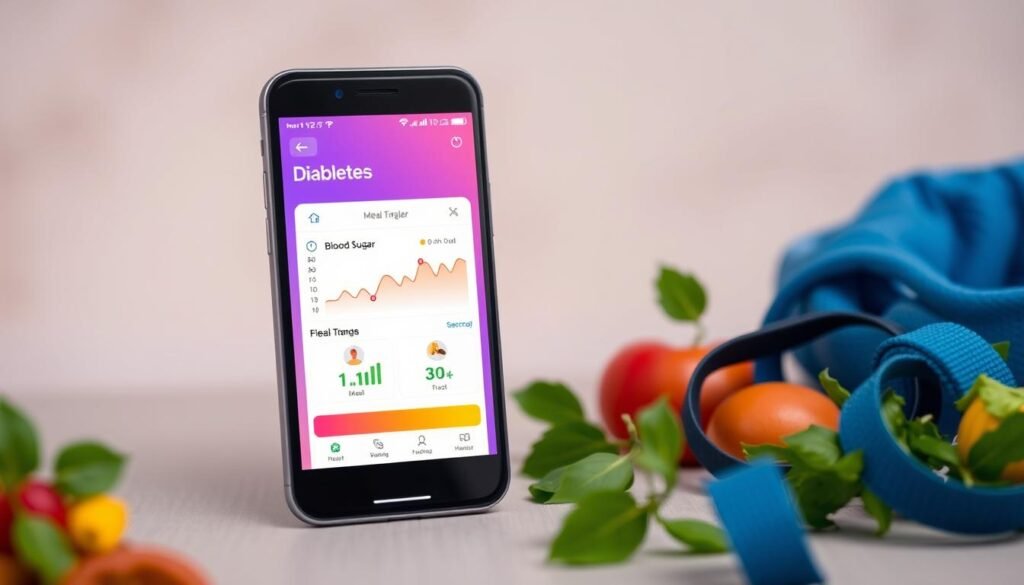
Staying Up-to-Date with App Updates
Keeping your diabetes management app up-to-date is key for good care. Diabetes management app updates bring new features and security fixes. These updates make managing your diabetes easier and safer.
The Role of Regular Updates in App Functionality
Updates keep your app working well with new systems and devices. Old apps can have bugs or security issues, risking your health data. With updates, you get better tracking and more precise health monitoring.
Benefits of Ongoing Support from Developers
Developers’ ongoing support builds a strong community. Your feedback can lead to changes that meet your needs. Being part of this community helps you get features that improve your diabetes care.
Understanding app updates and using developer support is crucial. It helps you manage your diabetes better. By staying current, you get the most out of your app and manage your health well. This approach leads to better health and more control over your diabetes232425.
Connecting with Support Networks Through Apps
Apps can help you connect with others who have diabetes. This can make managing your diabetes easier. You can talk to people who understand what you’re going through. Many apps let you join online groups to share experiences and get advice.
Online Communities for Diabetic Support
Online communities are great for people with diabetes. They offer a place to share and learn from others. You can talk about managing diabetes and how it affects your life.
Being part of these groups can really boost your motivation. You’ll see how others have overcome challenges and find tips to help you too.
Health Coaching and Guidance
Many apps also offer health coaching. This is a big help in making lifestyle changes. A health coach can give you advice on food, exercise, and taking care of yourself.
These coaches can help you make better choices for your health. They offer advice that fits your needs, helping you stay on track with your diabetes care.

Trial Periods and App Demos
Trying out a diabetes app trial lets you test different features of diabetes apps. It’s a chance to see how these tools can help you manage your health. This trial period helps you understand the app’s role in your health care.
How to Make the Most of Your App Trial
Get the most out of your trial by trying everything. Track your food, check your blood sugar, and set reminders for meds. This way, you’ll know which features work best for you.
Take notes on what features meet your health goals. This helps you pick the best app for your needs.
Identifying Features You Actually Use
Focus on the features that are part of your daily routine during the trial. See which tools keep you on track, like tracking your health or managing meds. This helps you choose an app that really helps your health.
Studies show apps can improve your health if used right. For more info, check out this study on diabetes self-management. It talks about what makes digital tools effective26.
Integrating Your Diabetes Management App into Daily Life
Adding a diabetes health tracker to your daily routine can really help manage your condition. Features like reminders for medication and blood sugar tests are key. They help you stick to your health plan.
A good medication reminder app can remind you when it’s time for medication or to check your blood sugar. This helps tackle the challenges of managing diabetes on your own.
Setting Reminders for Medication and Testing
Reminders in your diabetes app can prevent missed doses and keep your blood sugar testing consistent. Studies show that using eHealth apps can improve your self-care and health outcomes. This makes them a vital part of managing diabetes well27.
These tools help you respond quickly to your health needs. This boosts your ability to manage diabetes effectively.
Sharing Data with Your Healthcare Team
Sharing data from your diabetes app with your healthcare team is important. It helps everyone work together on your treatment plan. This openness leads to better insights and personalized advice, improving your health management journey.
Using diabetes apps for self-management can lead to better health metrics, like lower HbA1C levels28. Keeping your healthcare provider updated with your app’s data helps tailor your treatment plan.
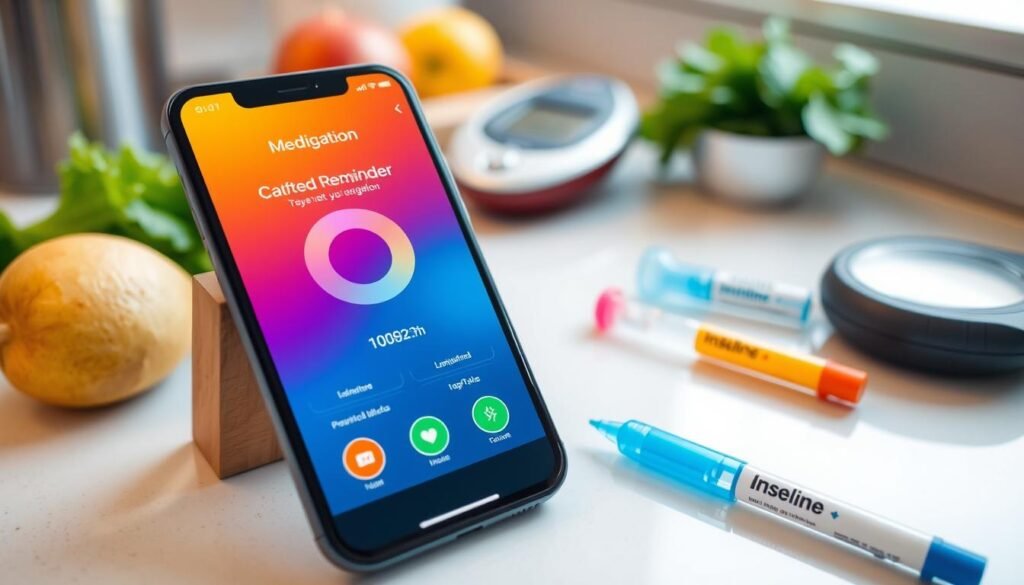
Using a Diabetes Management App for Meal Planning
Effective meal planning is key for managing diabetes. A good diabetes management app can help a lot. It lets you track what you eat, control carbs, and manage blood sugar levels. These apps have tools for diabetics, making meal planning fit your lifestyle.
Meal Tracking Tools for Diabetics
Meal tracking in diabetes apps helps you log meals and snacks. For example, the SNAQ App uses CGM and glucose meter data. It gives a detailed view of your eating and blood sugar responses.
The free version of the app lets you log up to five meals a week. For more features, a subscription costs $4 to $8 a month. The free version has some limits, like less history access29.
Incorporating Insulin Dosage Calculators
Many apps have an insulin dosage calculator. This helps figure out the right insulin dose for meals. Glucose Buddy, for instance, uses CGM and glucose meter data for insulin calculations.
The free version of Glucose Buddy has some features. Paid plans range from $19.99 to $59.99 a month. This is good for those who want detailed tracking29. The app also has over 1,000 diabetic-friendly foods, offering insights into your health.
Choosing the right app can make meal planning and insulin management easier. With tools like meal trackers and insulin calculators, managing diabetes becomes less stressful2930.
Analyzing Your Health Data for Better Decisions
Understanding your health data is key to better diabetes management. A diabetes logbook helps track trends and patterns in your blood sugar. Diabetes management platforms (DMPs) show how often your blood sugar is out of range, when it peaks, and even your A1c levels31.
This information guides you in making better choices for your daily life and treatments.
Using Trends to Inform Your Management Strategy
Regularly looking at data trends can show how diet and exercise affect your blood sugar. Apps like mySugr give insights into your daily blood sugar patterns, which are crucial for health data analysis31. Discussing these insights with your doctor helps make the right adjustments for better blood sugar control.
Studies show that tracking your blood sugar regularly can lower your A1C levels over time. This highlights the value of tracking trends in your diabetes logbook32.
Making Adjustments Based on Data Insights
Data from your diabetes logbook helps you make quick changes to your treatment plan. Real-time data analysis lets you act fast when your sugar levels are off, cutting down on looking back31. Better communication with your healthcare team through these platforms leads to more personalized management plans33.
Being empowered with health data analysis improves your decision-making. This leads to better diabetes management.
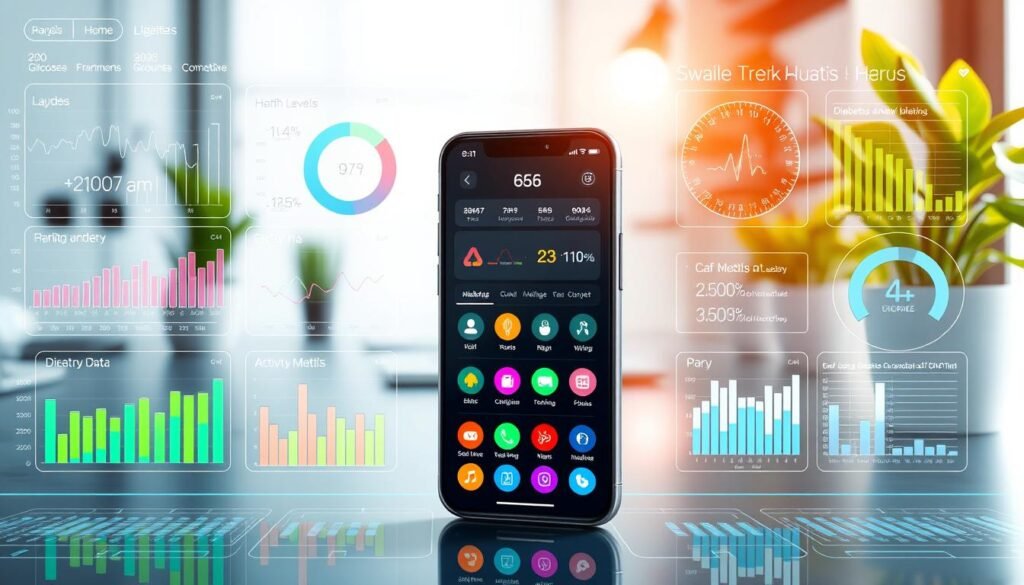
Conclusion
Choosing the right diabetes management app is key to your diabetes care. There are many tools out there, and knowing what you need helps pick the best one for you. Studies show that using these apps can lead to better blood sugar control. This is because they help users manage their diabetes more effectively34.
Apps offer features like tracking medications and food intake, making them fit your needs. Research shows that regular use of these apps can lead to better health. For example, a study found that users with consistent app use had an average blood sugar level of 7.01%35. Using these apps also connects you with others, offering support and motivation.
By using a diabetes management app daily, you improve your health care and take control of your health. To learn more about how mobile health apps help with diabetes, check out this research study. It highlights how these apps can improve patient care and outcomes36.
FAQ
What should I consider when choosing a diabetes management app?
How do diabetes management apps help improve self-care?
Are there different types of diabetes management apps?
What features are essential in a diabetes management app?
Can I connect my diabetes management app with my healthcare provider?
How can I maximize the benefits of my diabetes management app?
What are some popular diabetes management apps in 2022?
Are there free diabetes management apps available?
How do I know if an app fits my specific diabetes type?
How can I benefit from trial periods offered by diabetes management apps?
How do I effectively incorporate a diabetes management app into my daily routine?
What role do insulin dosage calculators play in diabetes management apps?
Why is analyzing health data important for diabetes management?
Source Links
- https://hgic.clemson.edu/factsheet/smartphone-apps-for-diabetes-self-management-support/
- https://www.rushmemorial.com/how-to-pick-a-diabetes-management-app/
- https://mydiabeteshq.org/top-5-diabetes-management-apps-for-daily-use/
- https://pmc.ncbi.nlm.nih.gov/articles/PMC9377471/
- https://diabetes.jmir.org/2023/1/e38592
- https://www.diabetesvic.org.au/living-with-diabetes-landing/managing-diabetes/diabetes-management/diabetes-management-apps/
- https://diabetesvoice.org/en/caring-for-diabetes/apps-and-their-potential-to-support-diabetes-management/
- https://pmc.ncbi.nlm.nih.gov/articles/PMC7048878/
- https://www.adces.org/education/danatech/apps-dtx/find-apps-tools
- https://diabetes.jmir.org/2022/3/e28153/
- https://pmc.ncbi.nlm.nih.gov/articles/PMC10855494/
- https://www.cogniteq.com/blog/diabetes-management-app-development-how-build-successful-app
- https://sequenex.com/developing-intuitive-mobile-apps-for-diabetes-management/
- https://topflightapps.com/ideas/diabetes-management-app-development/
- https://www.everydayhealth.com/hs/type-2-diabetes-care/diabetes-apps/
- https://diabetesed.net/apps-for-diabetes/
- https://www.verywellhealth.com/top-apps-for-diabetes-management-1087237
- https://beyondtype1.org/diabetes-data-management-apps-costs/
- https://www.type1strong.org/blog-post/best-diabetes-apps-of-2024
- https://effectivehealthcare.ahrq.gov/products/diabetes-mobile-devices/technical-brief
- https://diabetes.org/living-with-diabetes/treatment-care/diabetes-technology-guide
- https://beyondtype1.org/diabetes-data-apps-function-benefits/
- https://pmc.ncbi.nlm.nih.gov/articles/PMC3379602/
- https://phti.org/assessment/digital-diabetes-management-tools/
- https://beyondtype1.org/managing-diabetes-on-the-go-how-a-connected-insulin-pen-keeps-you-in-control/
- https://pmc.ncbi.nlm.nih.gov/articles/PMC10600709/
- https://www.type1strong.org/blog-post/gluroo-a-user-friendly-app-that-streamlines-diabetes-management
- https://dmsjournal.biomedcentral.com/articles/10.1186/s13098-019-0480-4
- https://www.snaq.ai/blog/best-diabetes-food-tracker-apps-2024
- https://apps.apple.com/us/app/my-diabetes-diet-meal-plan/id1562044498
- https://beyondtype1.org/diabetes-data-apps-doctors-visits/
- https://www.mysugr.com/
- https://pmc.ncbi.nlm.nih.gov/articles/PMC3840330/
- https://www.glucobyte.app/blog/revolutionizing-type-2-diabetes-care-unveiling-the-power-of-mobile-app-solutions
- https://www.jmir.org/2021/7/e23227/
- https://diabetes.jmir.org/2021/3/e17431/
